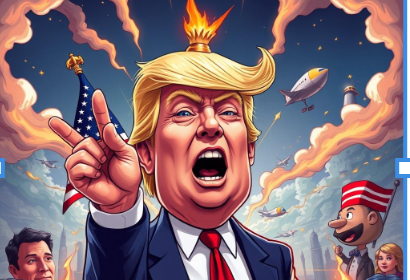$RSX $GOLD $BTC
#Putin #Trump #Russia #Ukraine #Ceasefire #War #Markets #Oil #Gold #Bitcoin #Stocks #Geopolitics
U.S. President Donald Trump and Russian President Vladimir Putin are preparing to engage in discussions over a proposed 30-day ceasefire in Ukraine. The high-stakes conversation, set to take place via a direct call, comes amid heightened geopolitical tensions and persistent volatility in financial markets. The proposal aims to pause hostilities as diplomatic negotiations continue, but investors remain on edge over how the outcome could impact key sectors, from energy to defense. Russia’s demands for a ceasefire deal could carry significant implications, particularly for commodities given the country’s role as a dominant supplier of oil and natural gas to global markets. A temporary truce could alleviate some market uncertainty, but traders will be watching closely for broader strategic commitments that could influence the direction of economic sanctions, supply chains, and equity markets.
The financial implications of the ceasefire discussion are substantial, with commodities and safe-haven assets positioned at the center of investor focus. Gold ($GOLD), traditionally a hedge during geopolitical crises, has seen price fluctuations in response to war-related uncertainty. Bitcoin ($BTC), often perceived as a decentralized store of value, has also reacted to developments in Eastern Europe, as regulatory concerns and capital flows from the region influence digital asset movements. Additionally, the Russian stock market remains in sharp focus. The VanEck Russia ETF ($RSX), a major fund tracking Russian equities, could see increased volatility based on signals from the Trump-Putin call. Any progress toward de-escalation might spur short-term rebounds, while continued deadlock or further sanctions could renew downside pressure on Russian-linked assets.
Energy markets are particularly sensitive to any changes in the Ukraine conflict, with crude oil prices closely tied to geopolitical risk. Oil supplies from Russia play a crucial role in global fuel availability, and any ceasefire could impact production levels or trade routes. The energy sector, already grappling with supply disruptions and OPEC+ policies, may see price swings depending on the outcome of discussions between Trump and Putin. Meanwhile, European markets remain deeply exposed to developments in Ukraine, as infrastructure concerns and economic stability continue to weigh on investor sentiment. European banking stocks, which have exposure to Russian energy and debt markets, could see sharp movements based on any clarity or new sanctions emerging from the negotiations.
Beyond oil and commodities, technology and defense stocks may also see immediate shifts following the Trump-Putin exchange. Defense contractors, which typically benefit from increased military spending during conflicts, could experience volatility based on ceasefire expectations. Meanwhile, global supply chains, particularly in semiconductors and raw materials, remain vulnerable to potential shifts in trade policy tied to the ceasefire framework. Market participants will be closely monitoring signals from Washington and Moscow, as traders weigh the likelihood of a temporary resolution against broader geopolitical realities that may continue shaping risk assets in the long run. With uncertainty still looming, investors anticipate significant market movement depending on whether the discussion results in tangible de-escalation or renewed tensions.











Comments are closed.